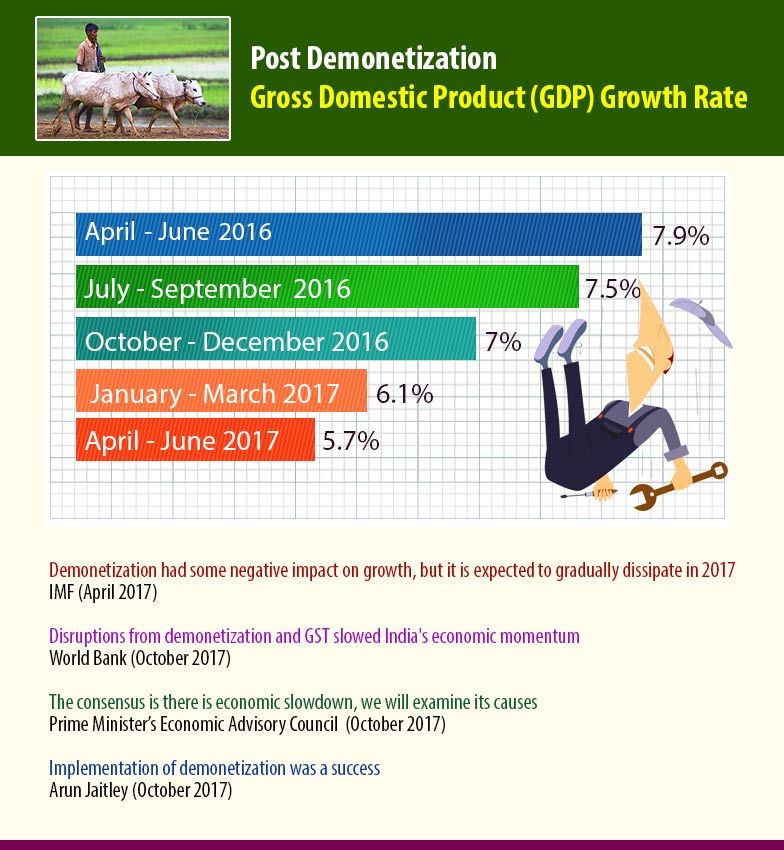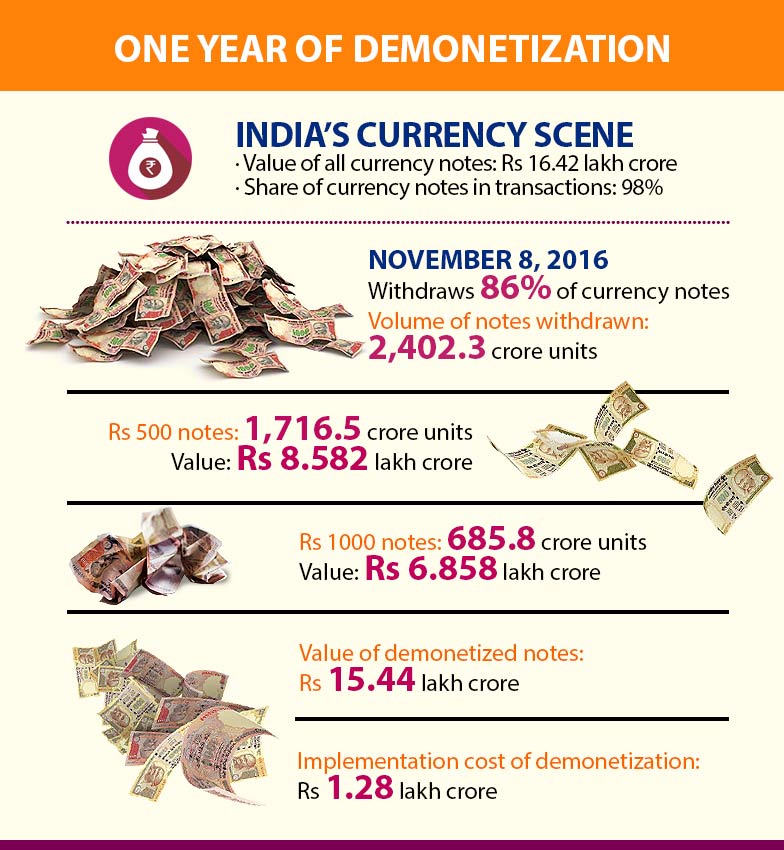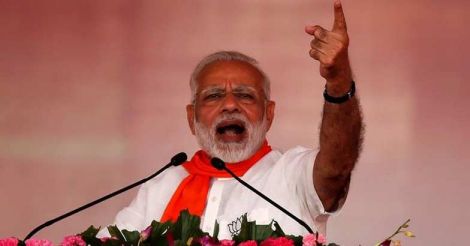Which is the word that the Indian media had printed and spoken about the most in the past one year? What was the concern Indians shared across the length and breadth of this country?
The answer is: ‘note bandi’ or note-ban.
Even though the official term was ‘demonetization’, it was ‘note-bandi’ for the common man, confused and inconvenienced at the snap order.
According to the prime minister Narendra Modi, it was the a move at the front-line of his war on black money.
The move, indeed, had a minor impact on the shadow economy initially, but didn’t cause much harm to it. The ‘war’ was, in fact, between political parties and their leaders.
Not just those in the opposition, even some within the ruling party and coalition dissented. Demonetization also affected political equations in the country.
Manmohan's Keynesian eloquence
Former prime minister Manmohan Singh was one of those who made the most scathing attacks on the government over demonetization.
His November 24 speech in Parliament, where he asked the prime minister to name any country where depositors cannot withdraw their hard-earned money from a bank, was a detailed analysis of the note-ban.
While Singh supported the fight on black money, the soft-spoken former prime minister and ace economist minced no words in launching a scathing attack on the way demonetization was implemented.
Responding to the argument about the long-term benefit of the note-ban, he quoted the famous economist John Keynes: “In the long run, we all are dead”.
Singh, who was also a former finance minister and Reserve Bank of India governor, highlighted the hardships faced by the common man, farmers and industry, and predicted the decision will shave off 2 percentage points from the country’s gross domestic product.
Singh’s words had since been extensively used to target the government and the prime minister. He sharpened the criticism two weeks later, in an opinion piece published in an English newspaper.
The underlying premise behind the decision seems to be the false notion that 'all cash is black money and all black money is in cash', he wrote.
It is the primary duty of a democratically elected government to protect the life and livelihood of the citizen, the PM has failed in this, he alleged.

Modi's rebuttal
Manmohan Singh’s prediction on the impact of demonetization on the economy has turned out to true. India’s GDP growth has slowed down considerably.
But in a strong rebuttal of the criticism, on October 4, Modi said it wasn’t for the first time that the growth had come to 5.7%.
GDP growth had slowed below 5.7% eight time during the time of the previous government, he noted.
Growth had shrunk to 0.2% and 1.5% when Manmohan Singh and P. Chidambaram were managing the economy, Modi said.
While accepting that the growth rate had come down, Modi said the government was taking measures to boost economic activity.
“Demonetization was a right decision. Now it is not easy to keep black money. Policy paralysis during the previous government has caused the slowdown.
“The economy is on a sound footing now. We will not hurt the future of the country by targeting short-term gains and the government will continue to undertake economic reforms”, the Prime Minister said.

GDP growth had slowed below 5.7% eight times
More than the attack by opposition parties like the Congress, what shook the ruling BJP and the government was the dissent within.
Former BJP ministers Arun Shourie and Yeshwant Sinha severely criticized the note-ban.
Sinha, a former finance minister himself, especially targeted incumbent Arun Jaitley, even not considering the political future of his son Jayant Sinha, a minister in Modi’s government.
Jaitley, by taking the blame over the slowdown on himself, was trying to guard the prime minister from the attack, he alleged.
Jaitley, on his part, retorted by calling Sinha 'an 80-year-old job applicant'. Justifying demonetization, Jaitley said direct tax collections had increased 15% this year.
Shourie called demonetization the single largest money-laundering scheme. Everyone who held black money got an opportunity to launder it, he alleged.
BJP’s Shatrughan Sinha and Subramanian Swamy also blamed demonetization for the slowdown.
Yoga guru Baba Ramdev, who had initially called critics of demonetization anti-national, changed his views later.
Banks had made huge money through demonetization. Even Modi wouldn’t have expected the wrongdoing of banks. The banking system is very opaque., he said.
A BJP Rajasthan MLA’s statement that top businessmen like Ambani and Adani had prior knowledge of demonetization too had hurt the party.
Shock waves of dissent
Modi thinks that he is the father of the nation, alleged Shiv Sena leader Uddhav Thackeray.
“We have for the last 25 years had an alliance with a cobra, which is now baring its fangs,” he said.
Other than causing a lot of difficulties to the people, demonetization has not brought any gains, he said, while alleging that the Modi government couldn’t touch the rich in the country.
The Shiv Sena was seen even backing Congress vice president Rahul Gandhi.
The Congress deputy chief is capable of leading the country, said the Sena, which is still a partner of the BJP at the center and in the Maharashtra government.
BJP-affiliated trade union BMS has demanded a stimulus package to boost the economy, causing further embarrassment to the ruling party.
It wants the government to double the number of working days under the rural employment guarantee scheme, increase subsidies, write-offs loans and implement steps to support the agriculture sector.
Paytm or Pay to Modi
The days after demonetization saw Rahul Gandhi and Modi intensifying their attacks on each other.
Terming Paytm as Pay to Modi, Rahul ridiculed the argument of a cash-less society.
Through note-ban, the Prime Minister had put a bombshell on the common man, he alleged.
Modi attacked Rahul saying he was sharpening his oratory skills.
By taking up the issue every now and then, and attacking the government constantly over its implementation, Rahul ensured that the matter didn’t go out of focus.
Pranab's word of caution
The then President, Pranab Mukherjee, too had talked about the possible short-term impact of demonetization on the economy.
While the step is aimed at fighting black money and corruption, steps should be taken to reduce the hardships of the poor, he said in an address to governors and lieutenant governors on the New Year eve.
These are unavoidable difficulties when considering the long-term gains, said Mukherjee, who had earlier called demonetization a bold decision.
Human chain against note-ban
The CPM and the left front severely criticized demonetization.
To protest against the impact of demonetization on the life of common people and Kerala’s co-operative sector, the left front organized a human chain stretching from Thiruvananthapuram to Kasargod.
The UDF too joined the LDF in protesting against efforts to target the co-operative sector.
CPM general secretary Sitaram Yechury called demonetization a disaster and said the prime minister and his office were responsible for it.
The step has helped only in increasing corruption at the top and money laundering, he said.
Foolish decisions like note-ban happen when people without a democratic mindset become rulers, chief minister Pinarayi Vijayan said.
A bigger threat than demonetization is the attitude of Modi while implementing it, the Kerala CM said.
The country could face anarchy if the government doesn’t change its decision, said CPM Kerala secretary Kodiyeri Balakrishnan.
This is an effort to corporatize the entire country, said CPI state secretary Kanam Rajendran.
BJP Kerala president Kummanam Rajashekharan called demonetization as an economic revolution and second independence struggle.
Attacks: left, right and center
Bengal chief minister Mamata Banerjee, one of the most vocal critics of demonetization, demanded Modi’s resignation and said one of the senior BJP leaders like L.K. Advani or Rajnath Singh should lead a national government.
She also asked the president to intervene and save the country.
Though she later softened her stand by saying that her opposition wasn’t against Modi but the BJP and Amit Shah, she again trained her guns at the government with renewed vigor.
Modi’s arch rival and Delhi chief minister Arvind Kejriwal called demonetization the most colossal event of corruption in Indian history.
The Samajwadi Party said demonetization was an effort to financially destroy opposition parties before the Uttar Pradesh election.
BJP’s big victory in UP subsequently suggests that demonetization had an impact on the election.
NDA ally Telugu Desham’s chief, Chandrababu Naidu, said the effects of demonetization had gone out of control.
He also softened the stand later, saying that he supported demonetization though its impact was still lingering.
The Kerala Congress said the prime minister was testing the patience of people.
By banning currency notes, Modi had broken the promise he had made to people, party chairman K.M. Mani said.
Demonetization has no validity unless it is done through legislation, said RSP leader N.K. Premachandran.
Modi may not have become a fakir, but the note-ban has made 90% of the country’s people fakir, BSP chief Mayawati said.
The Anna DMK, which usually has a soft stance towards the BJP, criticized the prime minister for speaking about demonetization outside Parliament but not inside it.
Bihar chief minister Nitish Kumar, though, supported demonetization from the beginning, calling it the right step to fight black money.
Kumar, who was seen as a tall leader in the opposition at the time, later joined the BJP-led NDA.
Uniting the Opposition
What the note-ban did was bring some much-needed unity among the the opposition parties which were hit badly by the Modi wave.
But on the first anniversary of the note-ban, splits and splinters are visible among the leaders of the opposition.
CPM general secretary Yechury didn’t attend a press conference called to announce the protest programs on the anniversary of demonetization.
Congress leader Ghulam Nabi Azad, Janata Dal’s Sharad Yadav and Trinamool Congress leader Derik O’Brien had met the press to detail the plans.
If anything, demonetization has further strengthened the undisputed leadership of Narendra Modi in the BJP and the government.
He again proved that he is the one who makes decision and implements that.
But it also slowed down his usual way of getting ahead unmindful of the opposition.
That has given a lifeline to the opposition parties that were wilted under his image.
It also indicates a shift towards pluralism again in Indian politics and an end to handshakes that are targeted only to win elections.
Demonetization was a litmus test of principles and values for political parties. People are closely watching for changing colors.

























 Narendra Modi
Narendra Modi